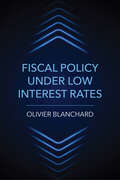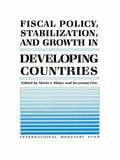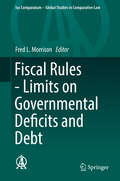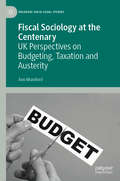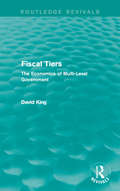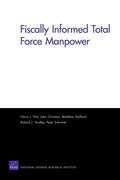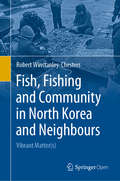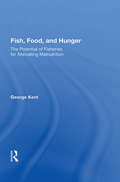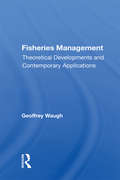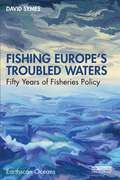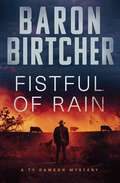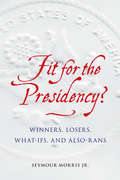- Table View
- List View
Fiscal Policy under Low Interest Rates
by Olivier BlanchardRethinking fiscal and monetary policy in an economic environment of high debt and low interest rates.Policy makers in advanced economies find themselves in an unusual fiscal environment: debt ratios are historically high, and—once the fight against inflation is won—real interest rates will likely be very low again. This combination calls for a rethinking of the role of fiscal and monetary policy—and this is just what Olivier Blanchard proposes in Fiscal Policy under Low Interest Rates.There is a wide set of opinions about the direction that fiscal policy should take. Some, pointing to the high debt levels, make debt reduction an absolute priority. Others, pointing to the low interest rates, are less worried; they suggest that there is still fiscal space, and, if justified, further increases in debt should not be ruled out. Blanchard argues that low interest rates decrease not only the fiscal costs of debt but also the welfare costs of debt. At the same time, he shows how low rates decrease the room to maneuver in monetary policy—and thus increase the benefits of using fiscal policy, including deficits and debt, for macroeconomic stabilization. In short, low rates imply lower costs and higher benefits of debt.Having sketched what optimal policy looks like, Blanchard considers three examples of fiscal policy in action: fiscal consolidation in the wake of the Global Financial Crisis, the large increase in debt in Japan, and the current US fiscal and monetary policy mix. His conclusions hold practical implications for economic and fiscal policy makers, bankers, and politicians around the world.
Fiscal Policy, Stabilization, and Growth in Developing Countries
by Mario I. BlejerA report from the International Monetary Fund.
Fiscal Positions in Latin America: Have They Really Improved?
by Jeromin Zettelmeyer Ivanna Vladkova-HollarA report from the International Monetary Fund.
Fiscal Reforms That Work
by C. John Mcdermott Robert F. WescottA report from the International Monetary Fund.
Fiscal Reforms in Low-Income Countries: Experience Under IMF-supported Programs
by George T. AbedIMF-supported Programs
Fiscal Regimes and the Political Economy of Premodern States
by Andrew Monson Walter Scheidel Monson, Andrew and Scheidel, WalterInspired by the New Fiscal History, this book represents the first global survey of taxation in the premodern world. What emerges is a rich variety of institutions, including experiments with sophisticated instruments such as sovereign debt and fiduciary money, challenging the notion of a typical premodern stage of fiscal development. The studies also reveal patterns and correlations across widely dispersed societies that shed light on the basic factors driving the intensification, abatement, and innovation of fiscal regimes. Twenty scholars have contributed perspectives from a wide range of fields besides history, including anthropology, economics, political science and sociology. The volume's coverage extends beyond Europe, the Mediterranean, and the Near East to East Asia and the Americas, thereby transcending the Eurocentric approach of most scholarship on fiscal history.
Fiscal Rules - Limits on Governmental Deficits and Debt
by Fred L. MorrisonThis book examines legal limitations on government deficit and debt and its impact on the ability of nations to provide services to their residents. It studies constitutional and statutory limitations, as well as those imposed by international treaties and other instruments, including those of both the European Union and the International Monetary Fund. The book contains a general report examining the fiscal rules that govern the budgets and expenditures of nation states. The general report is followed by a special report which covers the limits imposed by the European Union and by the smaller group of countries constituting the Eurozone. Ten national reports, describing the limits in their respective countries, form the basis of the general report. These countries include eight members of the European Union (five of which use the Euro and three of which do not), one other European state and one non-European state. The reports include two countries in which constitutional "debt brakes" limit national deficit and debt.
Fiscal Sociology at the Centenary: UK Perspectives on Budgeting, Taxation and Austerity (Palgrave Socio-Legal Studies)
by Ann MumfordThis book discusses the socio-legal tax state and its relationship to development, inequality and the transnational. 'Fiscal Sociology' commenced in 1918 when Joseph A. Schumpeter examined the links between capitalism and taxation, arguing that fiscal pressures on governments led directly to the development of tax collection, and the burgeoning growth of capitalist economies. The identification of taxation as an important component of capitalism has continued to change the way that theoretical sociologists conceptualise tax. This book documents the history of this literature to provide a summary of the topic for scholars seeking a bridge between taxation law and contextual, historical, and anthropological analyses of the development of the state, more generally. Whilst Schumpeter’s insights have been celebrated over the past one hundred years, taxation has slipped from the agenda of many scholarly disciplines, in relation to analyses of poverty, globalisation, and equality. Fiscal Sociology at the Centenary fills this gap. The implications of this literature for taxation law in the United Kingdom, in particular, are considered.
Fiscal Stimulus with Spending Reversals
by André Meier Giancarlo Corsetti Gernot MüllerA report from the International Monetary Fund.
Fiscal Sustainability And Competitiveness In Europe And Asia
by Ramkishen S. Rajan Tan Khee Giap Tan Kong YamOver the last two decades the fiscal positions of many advanced economies have deteriorated significantly, leading to ever-growing levels of public debt and mounting concerns about debt sustainability. Fiscal positions are set to weaken further on account of the worsening demographics which are likely to place upward pressure on public social expenditures. This book examines key issues and policy concerns relating to fiscal sustainability and competitiveness in European and Asian economies. In addition to estimating the extent of fiscal capacity or lack thereof for these economies, this book supplements the empirical analysis with country case studies.
Fiscal Tiers (Routledge Revivals): The Economics of Multi-Level Government
by David KingFirst published in 1984. This book brings together and develops the economic theory relating to the design and operation of systems of non-central government — positing major developments in several areas. It considers what functions systems most suitably perform in non-central governments, and their appropriate size and structure. How these authorities might finance themselves — by taxes, charges or loans — is analysed in detail. It also examines the use of grants by higher tiers of government and how such programmes should be designed. Concentrating on contemporary economic concerns, it relates the theory to practice in countries such as Australia, Canada, West Germany, the UK and USA.
Fiscal Vulnerability and Financial Crises in Emerging Market Economies
by Michael Kell Richard Hemming Axel SchimmelpfennigA report from the International Monetary Fund.
Fiscal Vulnerability and Sustainability in Oil-Producing Sub-Saharan African Countries
by Robert York Zaijin ZhanA report from the International Monetary Fund.
Fiscal and Macroeconomic Impact of Privatization
by Steven Barnett Jeffrey Davis Rolando Ossowski Thomas RichardsonA paper reviewing fiscal and macroeconomic issues in the privatisation of non-financial public enterprises in developing and transition economies.
Fiscal and Monetary Anchors for Price Stability: Evidence from Sub-Saharan Africa
by Alfredo Baldini Marcos Poplawski RibeiroA report from the International Monetary Fund.
Fiscally Informed Total Force Manpower
by Harry J. Thie John Christian Peter Schirmer Matthew Stafford Roland J. YardleyPresents the results of a short-term review of 27 publicly available manpower studies to discover methods that other organizations could use to make "fiscally informed" manpower decisions. The studies exhibit varying methods for determining manpower requirements; however, the method used may not be as important as other attributes, such as the direct involvement of a senior decisionmaker.
Fish, Fishing and Community in North Korea and Neighbours: Vibrant Matter(s)
by Robert Winstanley-ChestersThis open access book explores the histories and geographies of fishing in North Korea and the surrounding nations. With the ideological and environmental history of North Korea in mind, the book examines the complex interactions between local communities, fish themselves, wider ecosystems and the politics of Pyongyang through the lens of critical geography, fisheries statistics and management science as well as North Korean and more generally Korean and East Asian studies. There is increasing global interest in North Korea, its politics, people and landscapes, and as such, this book describes encounters with North Korean fishing communities, as well as unusual moments in the field in the People’s Republic of China, the Russian Federation and the Republic of Korea (South Korea). It addresses fish, fishing infrastructure, fishing science and fishing statistics and other non-human elements of North Korean and other nations’ developmental regimes as actors and participants within them as much as humans and their technologies. The book enables readers to gain extensive insights into the aspirations and practices of fishing in North Korea and its neighbours, the navigation of difficult political and developmental situations and changing ecological realities in a time of environmental and climate crisis familiar to many across the globe.
Fish, Food, And Hunger: The Potential Of Fisheries For Alleviating Malnutrition
by George KentThis book provides descriptive information on fisheries and nutrition, and outlines actions that could be taken to enhance the contribution of fisheries to the alleviation of malnutrition. It derives generalizations regarding the evaluation and design of fisheries projects and fisheries policies. .
Fisheries Management: Theoretical Developments And Contemporary Applications
by Geoffrey WaughAmong the problems of the modern fisheries industry is the persistent trend toward the severe depletion of fish stocks, resulting in low catch rates and poor economic returns, along with unnecessary accumulations of capital investments. Dr. Waugh argues that these problems call for effective management procedures based on bioeconomic modelling, which integrates the population dynamics of fish resources with the economic processes of harvesting and marketing. Assessing developments in bioeconomic theory, Dr. Waugh discusses why recent advances have not been fully translated into improvements in the management of marine fisheries. He cites the difficulties of reaching a consensus concerning suitable objectives for fisheries management, as well as the problems of designing a regulatory framework to improve the operation of the industry. To illustrate the utility of bioeconomic modelling, Dr. Waugh presents case studies of two Australian fisheries. A dynamic, stochastic, numeric model is developed for the Exmouth Gulf Prawn Fishery to provide insights into the optimal exploitation of a yearly resource, where fluctuations in recruitment, natural mortality, and catchability are important. The study of the New South Wales Abalone Fishery highlights the difficulties of obtaining the necessary overview of a fishery and the problems in collecting the data required for modelling and management.
Fishing Europe's Troubled Waters: Fifty Years of Fisheries Policy (Earthscan Oceans)
by David SymesSpanning the last 50 years of fisheries policy in Europe, this book is the parting contribution and career-spanning reflection from one of Europe’s most renowned social scientists working in the field of fisheries management and policy. The last 50 years have without doubt been the most turbulent years in the history of North Atlantic fisheries – a turbulence brought about by the actions of fishers, scientists and above all politicians. It is a period of change that sees a radical redrawing of the political geography of fisheries, globalisation of trade, the development of fisheries management towards increasingly restrictive regulation, and declining fish stocks. The book explains why the bold but deeply flawed Common Fisheries Policy persistently failed to deliver its basic goal of sustainable fisheries. The spotlight falls on the monolithic, highly centralised, command and control nature of the Policy that strives to apply a universal ‘one size fits all’ approach, thus creating a governing system wholly unsuited to the system to be governed, out of kilter with preferred models of governance, and disconnected from the practical realities of fishing as a livelihood in a challenging environment. A final section on Brexit focuses on its halting progress from concept to reality, the implications for the fisheries sector and the fateful final negotiations with the EU over the fisheries question. Seeking to explain why the anticipated benefits for the UK industry failed to materialise, attention is drawn to the misplaced political hubris over regaining ‘sovereignty’ in areas like the North Sea. This book will be essential reading for students, scholars, professionals and policymakers working on fisheries, marine governance, natural resource management, environmental policy and the European Project.
Fission and Fusion of Allies: The ROK Nuclear Quest and U.S.–France Competition and Cooperation
by Jooyoung Lee Lyong ChoiThis book traces the development of U.S-led global nuclear non-proliferation diplomacy during the three decades since the Eisenhower’s “Atoms for Peace” in 1953. The U.S. non-proliferation efforts had diverse obstacles. It had to prevent nuclear states’ export of nuclear technology while dissuading non-nuclear states from developing nuclear weapons. In addition, building non-proliferation regime was not always its top foreign policy priority. To understand the complex process of non-proliferation, the book examines the relations among three different actors in the nuclear field: a global non-proliferation regime builder (U.S.), a potential nuclear proliferator (France) and a would-be nuclear state (Republic of Korea). In tracing how they developed nuclear strategies, conflicting and compromising with one another, the book pays special attention to how the transforming Cold War structure in the 1970s not only affected foreign policies of the involved countries but also complicated their relationship. The exploration ultimately highlights the multidimensional nature of international discussion on nuclear non-proliferation as the ROK’s nuclear development attempts, U.S. non-proliferation efforts, and the U.S.-France nuclear technology cooperation in the 1970s were all deeply connected.
Fistful of Rain (The Ty Dawson Mysteries)
by Baron BirtcherThe second Sheriff Dawson mystery has &“lots of twists and turns that stretch back over years, then a mind-blowing ending that puts everything into place&” (Killer Nashville). Winner—2019 Best Book of the Year, Killer Nashville Ty Dawson, now the sheriff of Oregon&’s Meriwether County, is ready to put a trying year behind him, but he&’s afforded no such luck. In a country still coming to grips with the Vietnam War, Watergate, and Charles Manson, Ty&’s neck of the woods isn&’t safe from the turmoil—especially when a commune of young so-called hippies springs up out of nowhere . . . A longtime local sheep rancher accuses the Rainbow Ranch residents of livestock theft, putting Ty in the middle of a culture clash. Though Ty finds no evidence of a crime, the rancher brings in his own stock detective. Behind fences topped with razor wire, the commune and its enigmatic guru hold secrets of their own—many of which have nothing to do with peace, love, and understanding. Tensions flare, setting off a bloody wave of violence that will forever scar the place Ty calls home, unless he can stop it. &“Elegantly written . . . Ty may strike some readers as almost too smart, too well educated, and too pedantic for a small-town sheriff, but his insights into 1970s social issues make him an irresistible spokesman for the era.&” —Publishers Weekly &“A modern Western . . . The characters are well developed, and place descriptions make it easy to visualize the landscapes.&” —New York Journal of Books
Fit for the Presidency?: Winners, Losers, What-Ifs, and Also-Rans
by Seymour Morris Jr.Every four years Americans embark on the ultimate carnival, the Super Bowl of democracy: a presidential election campaign filled with endless speeches, debates, handshakes, and passion. But what about the candidates themselves? In Fit for the Presidency? Seymour Morris Jr. applies an executive recruiter’s approach to fifteen presidential prospects from 1789 to 1980, analyzing their résumés and references to determine their fitness for the job. Were they qualified? How real were their actual accomplishments? Could they be trusted, or were their campaign promises unrealistic? The result is a fresh and original look at a host of contenders from George Washington to William McAdoo, from DeWitt Clinton to Ronald Reagan. Gone is the fluff of presidential campaigns, replaced by broad perspective and new insights on candidates seeking the nation’s highest office.
Five Chapters on Rhetoric: Character, Action, Things, Nothing, and Art
by Michael S. KochinMichael Kochin’s radical exploration of rhetoric is built around five fundamental concepts that illuminate how rhetoric functions in the public sphere. To speak persuasively is to bring new things into existence—to create a political movement out of a crowd, or an army out of a mob. Five Chapters on Rhetoric explores our path to things through our judgments of character and action. It shows how speech and writing are used to defend the fabric of social life from things or facts. Finally, Kochin shows how the art of rhetoric aids us in clarifying things when we speak to communicate, and helps protect us from their terrible clarity when we speak to maintain our connections to others.Kochin weaves together rhetorical criticism, classical rhetoric, science studies, public relations, and political communication into a compelling overview both of persuasive strategies in contemporary politics and of the nature and scope of rhetorical studies.
Five Chapters on Rhetoric: Character, Action, Things, Nothing, and Art (G - Reference, Information and Interdisciplinary Subjects)
by Michael S. KochinMichael Kochin’s radical exploration of rhetoric is built around five fundamental concepts that illuminate how rhetoric functions in the public sphere. To speak persuasively is to bring new things into existence—to create a political movement out of a crowd, or an army out of a mob. Five Chapters on Rhetoric explores our path to things through our judgments of character and action. It shows how speech and writing are used to defend the fabric of social life from things or facts. Finally, Kochin shows how the art of rhetoric aids us in clarifying things when we speak to communicate, and helps protect us from their terrible clarity when we speak to maintain our connections to others.Kochin weaves together rhetorical criticism, classical rhetoric, science studies, public relations, and political communication into a compelling overview both of persuasive strategies in contemporary politics and of the nature and scope of rhetorical studies.
